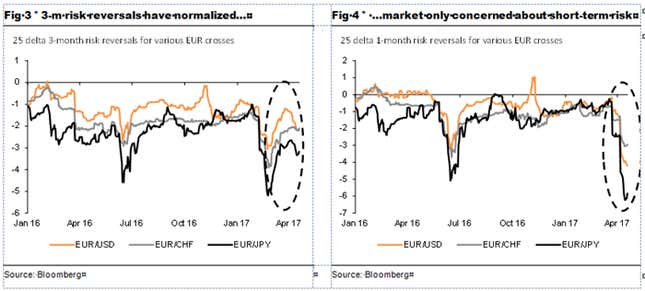For a long time, investors have considered the biggest risk to the status quo in France’s presidential election to be far-right candidate Marine Le Pen. Now, just days before the first round of voting, a late surge in support for Jean-Luc Mélenchon has surfaced an unexpected new threat: the far left.
Mélenchon’s recent jump in the polls forced markets to consider the chance that the second round runoff vote on May 7 could pit the far right against the far left. Both, for very different reasons, could radically alter France’s place in the EU, euro zone, and global markets. Le Pen is well known for wanting to quit the EU and ditch the euro. Mélenchon is no fan of the EU either, and also wants to pull France out of NATO, introduce an even shorter official work week, and impose a top income tax rate of 90%. His eye-catching campaign has featured appearances by hologram in addition to an online video game where players literally shake down the elite for money.
Traders have rushed to protect themselves from a potential plunge in the euro that could follow victory for Le Pen or Mélenchon, should the two populists garner the most votes in Sunday’s first-round vote and go through to next month’s runoff election. A foreign-exchange volatility metric, known as risk-reversals, shows that traders paying to protect themselves against a one-month fall in the euro versus the dollar, compared with those insuring against an increase, has touched levels not seen since the worst of the region’s debt crisis in 2011, according to the Wall Street Journal (paywall).
Analysts at ING are also watching the volatility in risk-reversals, and concluding that traders have been underestimating the risk of a Mélenchon-Le Pen showdown. Traders have priced in the possibility of a near-term upset, but seem less worried about the possibility of a “persistently bad outcome” further out, ING’s Petr Krpata wrote in a note to clients, comparing the volatility metric for one month in the future versus three months away.

Current polls don’t put a high probability on both Le Pen and Mélenchon making the second round of voting. Le Pen looks like making the runoff, but is predicted to lose to fellow frontrunner Emmanuel Macron, a 39-year-old former banker and socialist minister who formed a new centrist party just over a year ago. The next most likely outcome is Le Pen facing off against former prime minister François Fillon, a center-right candidate, whose campaign is steadily recovering after he was placed under investigation for the misuse of public money earlier this year.
Regardless of what the polls say, traders aren’t writing off the possibility that voters will reject all the centrist candidates in favor of the extremes, propelling Le Pen or Mélenchon to the presidency.
